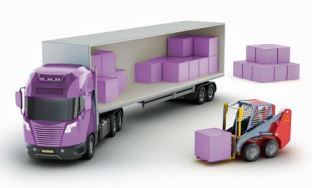Traditionally ERP systems have been a system of record containing a data model of the reality with objects such as customers, work centers and stock locations. These objects are integrated with business processes that interact with end users to capture business events. End users can be humans interacting through interfaces and using anything from a PC to a mobile device. End users can also be machines integrated with different technologies.
The emerging Internet of Things will mean that data capture will be automated to a much higher degree. It also means that human interaction will focus on monitoring and manage exceptions and to a much lesser extent be a matter of simple transaction reporting.
The ERP translates business events into transactions and accountings and produce all sorts of business documents such as orders, confirmations, labels and delivery notes.
Being able to do all these things is a huge efficiency gain for the organization.
Successfully implemented, ERP also integrate the organization. It will remove departmental as well as geographical boundaries and supply everyone with a single version of the truth.
Over the past 25 years ERP software has become more standardized and able to deal with a wide range of business processes, from procurement through manufacturing and sales to service and plant maintenance all in one integrated suite using one technology. This allows for a broader implementation of ERP with a more integrated and synchronized organization as the result.
At the same time ERP applications have become more tailored to support the specifics in certain industries. They have also become much more configurable allowing the end user to tailor the work environment and the IT departments to add and configure business objects and processes as well as reports and alerts.
In some industries or geographies that are less mature just getting one common ERP in place is a great improvement. But in the manufacturing industry, for example, where most companies are on their third or fourth generation of ERP, it is just evolution not a revolution. The ERP remains a system that primarily aims to keep master data and record business events and translate them into transactions and accountings.
I think the big potential for future improvements in mature industries is to understand how the ERP can create differentiation.
How do we create a business process that offers the distinct attributes needed to support the company’s strategies and create competitive advantage? How do we find an ERP broad yet specific enough to provide real business agility?
This is a move for ERP up the value chain. An investment in ERP is not just a way to get a modern, supported and cost effective replacement of an outdated ERP, but a key component on the path to strategic alignment.
- For more about strategic alignment – or business agility as it is labelled here – please have a look at As an agile business, how can IFS help you be agile?, a post I wrote last October.
Let me describe a couple of examples of how I think standard ERP software like IFS Applications can create differentiation.
1. Complete product lifecycle support in IFS Applications.

It allows companies to track all transactions and interactions for a product. From engineering, procurement of components, installation, service and repair and at the end de-commission. This 360 view of the product lifecycle offers a strong cost, speed and accuracy advantage over those who will have to track down product data using a wide array of different more or less integrated systems. In this case differentiation is obtained through broad, integrated process coverage.
2. Supply chain integration, visibility, mixed mode manufacturing and configurations.

All standard features of IFS Applications which allows for supply chain segmentation to tailor the balance between supply chain cost and service levels by product or geography. In this case differentiation is created by the combination of different supply models and the possibility to use those across a complex supply network in one common system.
Differentiation can come in many shapes.
Examples aside, many companies still focus on ERP as a system of record. As such ERP are invaluable and there’s no way back. Today’s modern ERP systems like IFS Applications offer broad process coverage, more industry specific capabilities and amazing configurability options.
Still, to yield the potential of modern ERP more attention needs to be brought to the ERP as an enabler of differentiation and competitive advantage.
Take a look at IFS Applications 9, our latest version released in May 2015, to see how far ERP has come. And look at what’s coming next. Hands-free ERP – imagine that!
Tom Hunn
ERP should Always have been about managing by exception. Just one further comment: If it ain’t broke, don’t fix it.